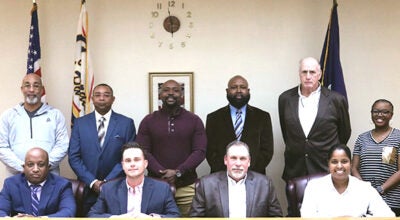Sunday Focus: COVID-19 virus infects city coffers
Published 8:23 pm Friday, June 19, 2020
|
Getting your Trinity Audio player ready...
|
NATCHEZ — The COVID-19 pandemic has dealt a substantial blow to the City of Natchez’s revenue over the last two months. However, officials said the economic damage was not as bad as they expected.
The City of Natchez has seen at least a $140,000 loss in revenue during March and April compared to the same time last fiscal year in sales taxes alone.
The amount of sales tax that the City of Natchez has received for the month of May is the lowest it has been in at least 18 years, according to data from the Mississippi Department of Revenue dating as far back as 2002.
The diversion of sales taxes from the Mississippi Department of Revenue is traditionally one month behind when the sales taxes were actually collected, so the sales taxes collected in May and April would reflect cash flow in the city during the months of April and March — when many businesses were closed due to COVID-19.
Natchez sales taxes collected in May 2020 were $345,847.26; in May 2019, $427,583.20; May 2018, $439,575.82; and in May 2017, $443,655.45.
Natchez received fewer sales taxes in May 2020 than in May 2019 by $81,735.94; fewer than May 2018 by $93,728.56; and fewer than May 2017 by $97,808.19.
The next lowest collection of sales taxes for the month of May was in 2003, when the city received $377,986.44.
April’s numbers also saw a roughly $60,000 loss from what was received in April 2019. In April 2020, the City of Natchez received $422,061.19 and in April 2019 received $485,099.18.
Weighing the impact
Ward 6 Alderman Dan Dillard, who is also a member of a financial committee created amid the pandemic, said the city has budgeted roughly $5.2 million in sales taxes for the entire fiscal year and may have seen a roughly 30% loss in sales tax revenue between March and April.
“It’s bad, but not as bad as I thought it would be,” Dillard said. “I was expecting a bigger drop in sales numbers and hopefully this is something that we can work on as far as closing the gap.”
As business have started to reopen, Dillard said he anticipates the revenue starting to trickle back up but still be slightly lower than last fiscal year for the next few months.
Natchez Mayor Darryl Grennell echoed Dillard’s response to the city’s sales tax revenue and said that the operation of essential businesses may have kept the city afloat.
“During the pandemic, we’ve had a lot more people going to what we have identified as essential businesses, grocery stores and hardware stores, because a lot more people were staying at home and working on their houses to get some things done. I’m thankful it wasn’t a lot worse as far as the economic impact on the city,” Grennell said.
Softening the blow
Before COVID-19 became a pandemic, Darryl said he’d instructed all city departments to avoid all major purchases and hold off on traveling and hiring any new employees — which are practices that the city would need to continue doing throughout the remainder of this fiscal year, he said.
“There is no question for the rest of this fiscal year, even after my tenure as mayor ends, I would hope the next administration would continue the trend of cutting back on spending in order to survive this pandemic in terms of the economic impact that it will have,” he said.
Grennell said all departments had decreased their expenses tremendously compared to last fiscal year. Major street projects, vehicle purchases, and other non-essential purchases have been placed on hold, Grennell said.
“Hopefully the expenditures have decreased enough that it will all balance out,” Grennell said.
As of Friday Grennell said he had not seen any relief funds for municipalities being dispersed from the state like he’d hoped.
“It would be wonderful if the state would send some of the stimulus money they’ve received from the federal government to municipalities,” Grennell said.
Dillard said taking out a loan to finish out the fiscal year is not out of the question.
“Borrowing money would not be off the table for obvious reasons. This is a global pandemic and we are feeling the effects of it just like everyone else,” he said. “Finishing out the fiscal year without borrowing millions is still within reach, but it won’t be without effort and it won’t be without sacrifice and it won’t be easy.”





